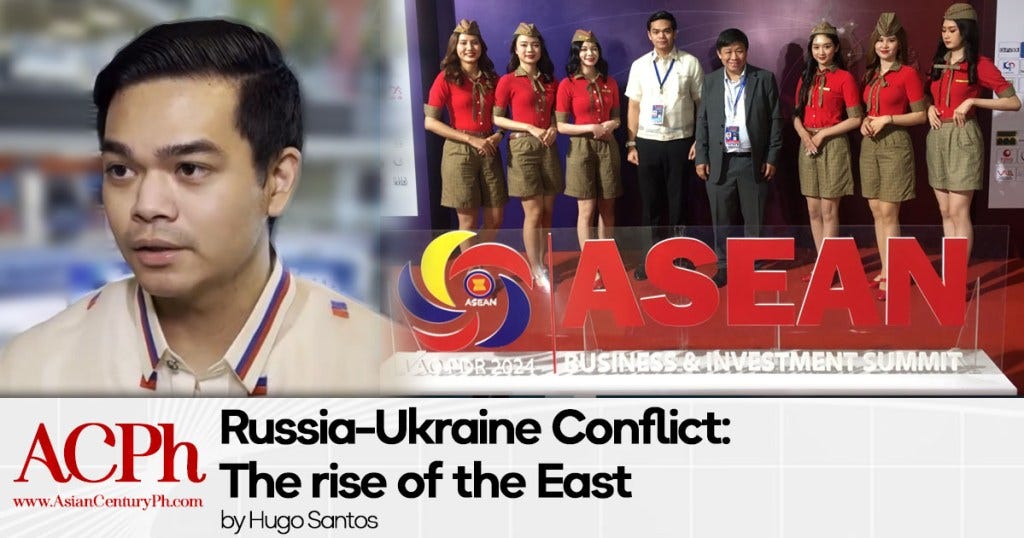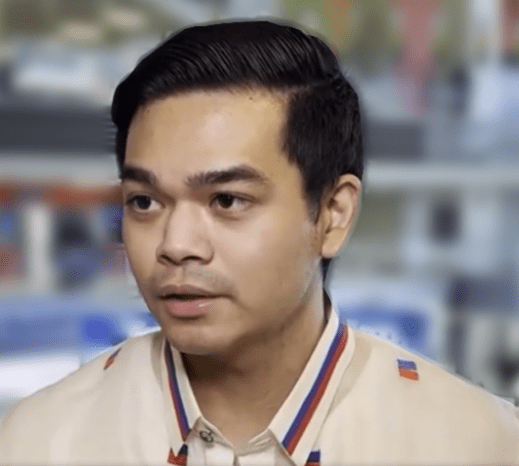Russia-Ukraine Conflict: The rise of the East
By: Hugo Santos
Youth Representative,
Asian Century Philippines At Vladivostok Eastern Forum
At the beginning of the conflict in Eastern Europe the whole world was taken by surprise and that includes Asia. At first most of the countries condemned the violence in the conflict from both sides, however Asian economies i.e., ASEAN wanted to maintain their neutral foreign policy. As the fuel price hiked over the year most developing economies in Asia had to maintain dialogue with Moscow especially the large economies like China and India. Apart from the two largest developing economies in Asia, regional organizations such as ASEAN became more relevant in global trade. This is very visible when Russian President Vladimir Putin hosted Southeast Asian leaders in Russia in the past three years.
ASEAN centrality has always been the tradition of the regional bloc in major global affairs and that includes the Russia-Ukraine conflict, despite certain Western pressure ASEAN member states chose to stay neutral when it comes to imposing sanctions on Moscow. Russia is a key dialogue partner of ASEAN and this is an avenue where both sides can engage from all sectors. ASEAN stood out when certain countries such as Malaysia, Myanmar, Vietnam, Indonesia and Lao PDR engage with Russia despite pressure from key Western allies; this is because they are prioritizing their economy instead of polarizing the geopolitical situation.
The US-China trade war also prompted Asian countries to explore the Russian market as they hedge with other regional powers to boost their pandemic hit economy. Developing countries in Asia always had the dilemma of picking either the United States or China as there will be consequences if one aligns with one over the other. Russia compared to China has no regional disputes with the Asia-Pacific region, and trade with the region is growing due to Russia’s development of the Far East region.
Over the years of the Russia-Ukraine conflict leaders from China and India visited Russia to focus on their bilateral interests in all sectors as they are all the largest economies in BRICS as well as being key members of the Shanghai Cooperation Organization (SCO) and the G20. After the visits of both Paramount leader Xi Jinping and Prime Minister Narendra Modi trade between the two largest Asian economies increased likewise their gas imports from Russia as both countries are manufacturing economies.
Constructivist approach:
Personal interaction plays a huge role in diplomacy especially when heads of state meet in person after the hiatus due to the pandemic. Diplomacy is made in different forms and every move counts social interactions and personalities are the less formal way of diplomacy these are constructed through tete-a-tete which is done on a personal level these can be seen in “pull-aside” meetings between world leaders. Decisions are made on a personal level and most of the time it works instead of the bureaucratic layers made through regional bodies. Most state visits are done through pull- aside meetings in other regional conferences such as ASEAN or APEC.
A clear example of this approach is the interactions between North Korean leader Kim Jong Un and other world leaders, considering the fact that Chairman Kim is one of the most isolated leaders in the world. His interactions with the likes of then President Trump improved relations in the Korean peninsula through Trump’s charm offensive. In this generation, state actors like world leader’s personalities are a huge factor when it comes to foreign policy such as the populist strongman type or the peace-making type of leadership. These determine the mood of the people in their respective countries and how they deal with foreign relations.
In the case of the Russia-Ukraine conflict Russian President Putin seems to be used to this approach as he has interacted with almost all world leaders around the world throughout his leadership, this gives him the upper hand in terms of economic interests at least. Moscow has always focused on both the European and Asian market ever since the collapse of the Soviet Union and trade relations never deteriorated. This is because Asia needs Russian oil and natural gas to boost their manufacturing economy. The reemergence of Russian influence in the region is also the outcome of the US-China rivalry wherein Russia is seen as an alternative partner when it comes to trade and commerce, considering the opportunities the Russian Far East has to offer.
Russia and China recently declared their “no limits partnership” to solidify their partnership this is a huge development in the constructivist way of diplomacy due to the personas of both President Xi and President Putin.For India Prime Minister Modi considers President Putin his “dear friend” and this is how the PM spent his first foreign visit after his recent election to show Russia that they are a traditional ally of New Delhi. Under the Modi administration India is focused on its economy and plays the mediator role in global affairs particularly between Russia and the West.
Realpolitik approach:
“Realpolitik” is used by developing Asian economies in ASEAN, Vietnam is considered a traditional partner for Russia so it is no surprise that with the recent visit of President Putin to Hanoi economic relations improved in all sectors from natural gas to arms deals. The same scenario goes with Chairman Kim Jong Un and President Putin where the latter reciprocated Mr. Kim’s visit to Russia in 2023, both Moscow and Pyongyang improved their relations over the years. both sides assured themselves of a mutual assistance in case of aggression, this is not new considering their historic partnership over the years. Vietnam and the DPRK are considered traditional partners for Moscow, however new partners such as Malaysia and Indonesia are focusing on national interests hence cooperating with Russia may benefit their economy.
Their foreign policy is geared towards ASEAN’s traditional neutrality stance. In 2024 alone President-elect Prabowo Subianto visited Russia to affirm strong ties between Moscow and Jakarta, as part of Mr. Subianto’s world tour before he became president, Nuclear Energy is one of the key priorities for Jakarta where the Russian source is very attractive. In the case of Malaysia like Indonesia, national interests are their priority and Prime Minister Anwar Ibrahim made it clear that Kuala Lumpur would be working with Russia to boost its economy and expressed his interest to join BRICS. Prime Minister Ibrahim was a keynote speaker invited by President Putin in the Eastern Economic Forum 2024 and the PM emphasized the importance of economy he went as far as saying that trade relations are different from political tensions such as the South China sea, Mr. Ibrahim also noted that the Philippines should be very careful with dealing with China as he does not want South East Asia a battleground of superpowers.
Discussion analysis:
Asian leaders have the liberty to go both ways with being multi-aligned with both the West and Russia;this way of hedging boosts their image domestically as it captures all markets. Some organizations make these social interactions possible such as the ASEAN summits wherein dialogue partners like Russia can communicate with ASEAN states at a multilateral level. Realistically Southeast Asian states stay neutral to all major conflicts in the world to get the best of all worlds despite possible pressures from the Global North Asian leaders still choose to engage with Russia to benefit from the rising BRICS economy and at the same time there is an annual ASEAN-Russia summit within the framework of the ASEAN summits.
Since 2022 Russia has invited leaders from the ASEAN leaders from Lao PDR, Vietnam, Myanmar, Indonesia and Malaysia to its flagship Eastern Economic Forum held in the Far East city of Vladivostok this is where President Putin and leaders from ASEAN engage in their economic interests that will benefit both sides. The consistent visits from ASEAN leaders is a testament that western sanctions don’t really work on Russia because Asian leaders still choose to engage with Moscow and this is a clear indication that Russia has a huge bearing in the world.
Other Asian countries still engage with Russia without need of the regional blocs such as the case with Turkiye and Mongolia. Mongolia is a member of the ICC and yet they decided not to arrest President Putin upon his visit to Ulaanbaatar. Both Turkiye and Mongolia are supposed “allies” of the West however their realistic approach is focused on the economy of the country considering the fact that Mongolia shares a huge border with Russia bilateral relations shall be maintained despite the geopolitical situation as Mongolia’s mining industry is very important in its trade with its Northern Neighbor. In the case of Turkiye the grain deal is always a priority when Turkish President Erdogan visits Russia, Ankara plays a major role in both the Russia-Ukraine conflict and the conflict in the Middle-East this is why constant communication with Moscow is important despite being a NATO member state.
Clearly Ankara is the only open convener to both Moscow and Kiev as Mr. Erdogan has good personal relations with Mr. Putin and Mr. Zelensky, Ankara tried to create peace between the two because the Turkish economy relies on both Russia and the West. Realistically Turkiye benefits with the conflict as both sides need Ankaraas they have open communication to both sides, this will boost the Turkish leader’s image at home and abroad. Other Asian countries such as Uzbekistan Benefited in the conflict as Tashkent became a new market for Russian consumers to get products from the Western world and vice versa through black-market economy.
Russia’s constructivist approach goes well with ASEAN’s realpolitik approach as they both benefit from the relationship. Russia’s image in the global stage presents that it is not as isolated as the Western media perceives them because non-traditional allies like Malaysia and Turkiye are engaging with Moscow like never before. For ASEAN countries as well as other Asian economies that engage with Moscow it shows that they are traditionally neutral with global affairs when it comes to the global supply chain and trade. Realistically the western international system can be circumvented and its power politics no longer work.
This is really prevalent with President Putin’s interactions with his Asian counterparts where the interactions are very warm and both sides are very receptive in their trade policy because they know it will be mutually beneficial. However, this does not apply to all developing countries at the moment due to secondary pressure from traditional Western partners such as Japan and the Philippines, these are the limitations of being part of a treaty ally in the case of the Philippines. Multilateral forums have their limits due to each country’s foreign policy and interests.
Conclusion:
The Russia-Ukraine war paved the way to the emergence of the Asian economy as most of them were very resilient after the pandemic, this is why they were very realistic when it comes to dealing with Russia because for Asian leaders the global supply chain should not be disrupted by geopolitical tensions. In a way, a country like Malaysia is seen as an independent state actor when it comes to foreign policy as they focus on their interests and this gives investors the confidence to invest in Malaysia due to Mr. Ibrahim’s policies. ASEAN is the fastest growing region in the world due to its diversity and its majority’s independent foreign policy which makes them “Friends to all, enemy to none”. Investors’ confidence from both sides engage with these economies despite the polarizing world prioritizing their national interests to improve their economy. ###
WATCH – Hugo Santos in ASEAN Summit – AsianCenturyPH.com Interview
Hugo Santos
Youth Representative
Asian Century Philippines Strategic studies Institute,
Master of Arts in International Studies
Miriam College
Email: contact@asiancenturyph.com
Facebook: https://www.facebook.com/asiancenturyph/
Twitter: https://twitter.com/AsianCenturyPH





